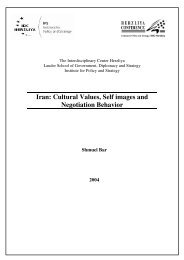Bashar's Syria: The Regime and its Strategic Worldview Shmuel Bar ...
Bashar's Syria: The Regime and its Strategic Worldview Shmuel Bar ...
Bashar's Syria: The Regime and its Strategic Worldview Shmuel Bar ...
Create successful ePaper yourself
Turn your PDF publications into a flip-book with our unique Google optimized e-Paper software.
382 S. <strong>Bar</strong>family is also linked by marriage to the al-Asad family through the marriage ofGhazi’s son, Yarob to the daughter of Jamil al-Asad. <strong>The</strong> Fayad family—the children of Shafiq al-Fayad (retired General of the old guardfrom the Alawtie Kalabiyya tribe) have all married into the old <strong>Syria</strong>n elite. His son‘Ala is married to the daughter of Rif’at al-Asad, his son Marwan is married to NadaNahas (Shi’ite, the family owns the Nahass Group 63 ), <strong>and</strong> another son, George, ismarried to Rania Boulad (a Christian). <strong>The</strong> Khaddam family—‘Abd al-Halim Khaddam has two sons (Jamal <strong>and</strong> Jihad) <strong>and</strong>one daughter. One of his sons married into the old Damascene al-Attasi family. Hisgr<strong>and</strong>-daughter (who was known in social circles in Damascus for her ostentatiousflaunting of her wealth) is married to the son of Rafiq al-Hariri. Other family connections include: ‘Ali Duba’s son, Nidal is married to the eldestdaughter of former <strong>Syria</strong>n Minister of Information, Mohammad Salman.“Old Guard—“Young Guard”<strong>The</strong> Fading of the “Old Soldiers.” Bashar’s position as leader of the party is h<strong>and</strong>icappedby the presence within the regime of a formidable “old guard.” By virtue of having beenprivy to the wills <strong>and</strong> ways of the late father <strong>and</strong> president for a longer period than Basharhimself (as one observer noted, these are “the men whom Bashar calls “uncle”), <strong>and</strong> havinga common experience of struggle when the party was cl<strong>and</strong>estine, these men possess a“moral weight” <strong>and</strong> are a constant reminder of Hafez al-Asad’s legacy.This constraint has been the object of much debate among observers of <strong>Syria</strong>n politics.For the first years after Bashar al-Asad came to power, the predominant question was thatof his relations with this “old guard.” <strong>The</strong>se relationships began to lose their cohesiononly towards the end of the Hafez al-Asad era, when some of them looked askance at thehereditary succession scenario that Hafez al-Asad had designed, <strong>and</strong> the ill leader decidedto put aside loyalty to his old comrades in favor of clearing the field for his son <strong>and</strong> heir.This preemptive “purge” resulted in the dismissal of key figures of the old guard such asHikmat Shihabi (Chief of Staff, retired in 1998), Mohammad Khouli (Air Force Comm<strong>and</strong>er,retired in 1999), Adnan Makhlouf (Republican Guard Comm<strong>and</strong>er, retired in 1995), AliDuba (Military Intelligence Chief, retired in 1999 <strong>and</strong> seen frequently in Europe), <strong>and</strong>others.Later, after Bashar came to power, he effectively moved aside most of the residual“old guard.” Some were sent out to pasture with honor (such as Defense Minister MustafaTlas <strong>and</strong> Chief of Staff ‘Ali Aslan) <strong>and</strong> others forced into exile (including former Chiefof Staff Hikmat Shihabi <strong>and</strong> former Vice President ‘Abd al-Halim Khaddam) <strong>and</strong> otherseven “committed suicide” (such as former Prime Minister Mohammad Zu’bi <strong>and</strong> InteriorMinister Ghazi Kana’an). 64 <strong>The</strong> former head of internal security, Bahjat Suleiman, who wasconsidered close to Bashar al-Asad, was removed from his post, apparently on the urgingof Asef Shawkat. 65 Most of these former members of the leadership no longer hold anypositions of formal power or influence (even as members of the “Central Committee”). <strong>The</strong>long decades that they were ensconced in their positions in the party <strong>and</strong> the government,<strong>and</strong> the patronage system that they developed, suggest that they should still have someresidual power through their protégées <strong>and</strong> heirs even after their forced retirement. Thisdoes not seem to be the case. <strong>The</strong> picture that arises from the present alignment of the “oldguard” is that they have been effectively neutralized, <strong>and</strong> any residual power they wieldis mainly through a community of interests within the party bureaucracy, their economicpower, <strong>and</strong> Bashar’s breaking with those who represent his father’s heritage.
















